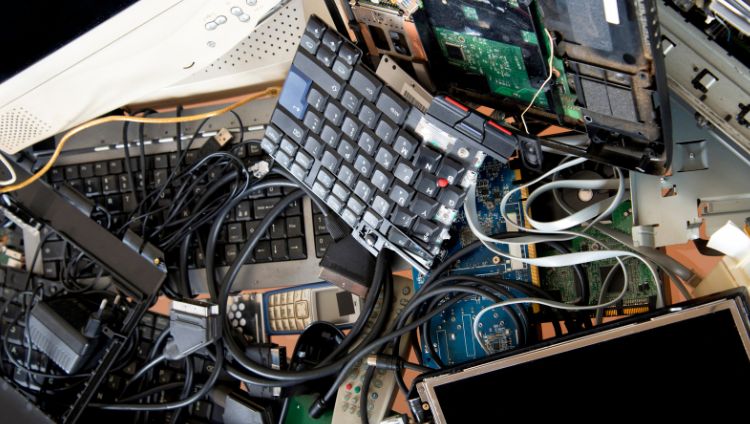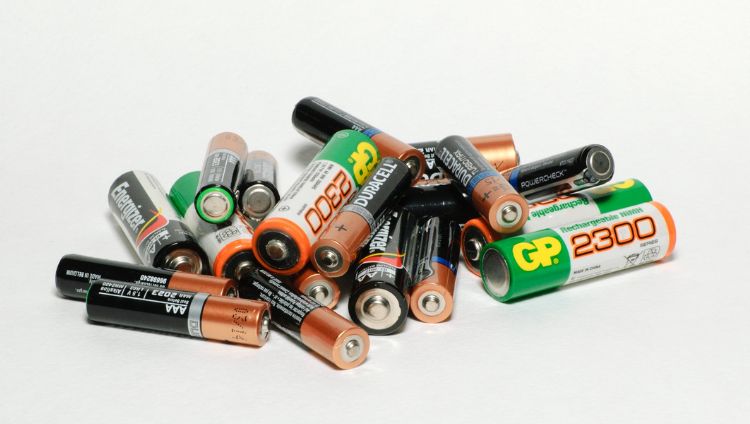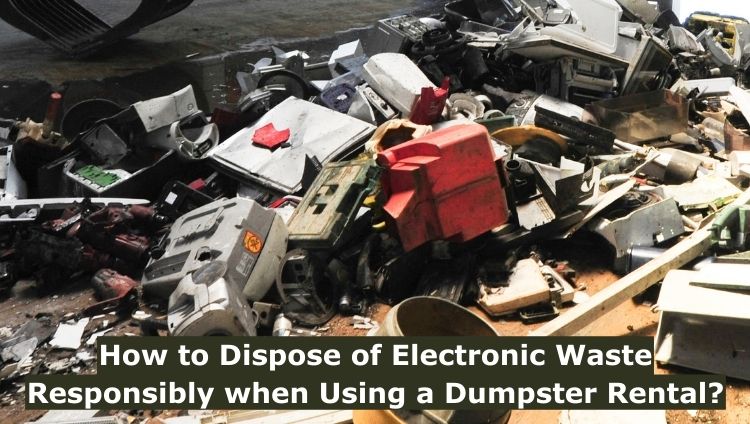Dispose of electronic waste, also known as e-waste, in a responsible manner when using a dumpster rental is extremely important.
This is not only because it helps protect the environment but also because it keeps you in line with legal requirements.
E-waste contains materials that can be harmful, and it often contains valuable parts that should not be wasted by ending up in a landfill.
If you want to know how to dispose of electronic waste responsibly when using a dumpster rental? Check out our easy-to-follow guide!
1. Recognize What Qualifies as E-Waste
To get started, you need to know what items are considered e-waste. Some common examples include old computers, laptops, monitors, televisions, printers, scanners, cell phones, tablets, and any electronic accessories like cables.

2. Keep E-Waste Separate
It’s essential to keep e-waste distinct from your regular trash. Designate a specific area in your project space for collecting and storing e-waste separately.
This ensures it doesn’t get mixed with other waste types.
3. Consider Reuse or Recycling
Before discarding electronic waste, take a moment to assess whether any items can be reused or recycled. If your electronics are still functional, consider donating or selling them to reduce waste and assist others.
Check for local electronic recycling programs or designated drop-off locations in your area. Many communities provide specific facilities for e-waste disposal, enabling you to dispose of your items responsibly and ensure they are handled properly.
Related Post: How to Properly Recycle Electronic Waste?

4. Securely Remove Data
If any of your electronic devices hold personal or sensitive data, ensure that you securely erase or destroy that data before disposal.
This may involve wiping hard drives,, resetting devices to their factory settings, or physically destroying storage media to safeguard your privacy.
5. Learn About Local Regulations
Research and understand the laws in your area regarding the disposal of e-waste. Some places have specific rules about how certain electronics must be handled, and it’s essential to comply with these regulations.
6. Check Dumpster Rental Guidelines
Contact the company providing your dumpster rental and ask them about their policies for disposing of e-waste.
Some rental companies might have rules or recommendations for dealing with electronic items in their dumpsters.
Related Post: Waste Management Dumpster Rules

7. Use Certified E-Waste Recyclers
Ensure that the dumpster rental company you utilize partners with accredited recycling facilities for electronic waste disposal. These specialized facilities possess the expertise and resources necessary for the safe handling of electronic waste, thereby contributing to environmental preservation.
8. Remove Batteries Separately
Before discarding electronic devices, ensure to extract the batteries. These batteries are categorized as hazardous waste and necessitate individual recycling procedures. Many electronic retailers and recycling facilities offer services for the proper disposal of batteries.

9. Protect Items with Original Packaging
When disposing of large electronic items, such as old TVs or computer monitors, it’s best to keep them in their original packaging if possible. These boxes are specifically designed to protect the items during transport and recycling.
By adopting responsible e-waste disposal practices when using a dumpster, you actively contribute to environmental conservation. Proper handling of electronic waste minimizes potential hazards, ensures valuable materials are recycled, and promotes a cleaner, safer, and more sustainable future for all.
Remember that:
Load E-Waste Carefully: – When placing e-waste in the dumpster, handle it with care to prevent any damage.
Broken electronics can release hazardous materials, so proper loading is crucial.
Keep Records: – Maintain records of how you dispose of e-waste. This includes any certificates or receipts from recycling facilities.
Such documentation can be helpful, especially for businesses or organizations, to demonstrate responsible disposal practices.
Report Improper Disposal: – If you come across instances of e-waste being discarded improperly in public dumpsters or areas, report it to the relevant authorities.
Encourage responsible disposal practices within your community.
Frequently Asked Questions
What qualifies as electronic waste (e-waste)?
Waste includes any electronic devices or equipment that are no longer in use or have become obsolete.
Common examples are old computers, monitors, televisions, cell phones, printers, and electronic accessories.
What is the significance of responsibly managing electronic waste disposal?
E-waste often contains hazardous materials like lead, mercury, and cadmium, which can harm the environment if not properly handled. Additionally, many electronic items contain valuable components that can be recycled, reducing the need for raw materials and conserving resources.
Can I simply throw e-waste into the dumpster with my other trash?
No, it’s not advisable to mix e-waste with regular trash. E-waste should be separated and disposed of properly to prevent environmental contamination and promote recycling.
How should I prepare electronic devices for disposal?
Before disposing of electronic devices, ensure that any personal or sensitive data is securely removed.
This can involve wiping hard drives, resetting devices to factory settings, or physically destroying storage media.
Where can I find e-waste recycling programs or drop-off locations?
Many communities have dedicated e-waste recycling centers or offer electronic recycling events.
Check with your local government, recycling centers, or electronic retailers to find nearby options for responsible e-waste disposal.
What if my dumpster rental provider doesn’t allow e-waste in their dumpsters?
If your rental provider has restrictions on e-waste disposal, consider alternative methods, such as using local e-waste recycling centers or participating in electronic recycling events.
Are there any regulations governing e-waste disposal?
Yes, regulations regarding e-waste disposal can vary by location. It’s essential to research and adhere to local, state, and federal laws to ensure compliance with proper disposal methods.
Can I remove batteries from electronic devices and throw them in the dumpster separately
Batteries are considered hazardous waste and should not be thrown in the dumpster.
Take out the batteries from electronic gadgets and ensure they are recycled individually. Many electronic retailers and recycling centers accept batteries for proper disposal.
Should I keep the original packaging for larger electronic items?
Whenever possible, it’s a good idea to keep the original packaging for larger electronic items like televisions or monitors.
This packaging can help protect the items during transportation and recycling.
Conclusion:
Calculating the duration of a dumpster rental for your specific project is a strategic and responsible undertaking.
It allows you to efficiently manage waste disposal while staying within your budget and complying with local regulations.
If you go through these steps, starting from checking out your project needs to having a good chat with the rental company, you’ll be all set with the perfect dumpster for your project. It’s not just about getting the job done; it’s also about being eco-friendly. Planning things right won’t just save you some bucks and time but will also help keep our planet clean. So, it’s a win for your project and for Mother Earth!
Visit our blog to find out better ways to handle waste.


